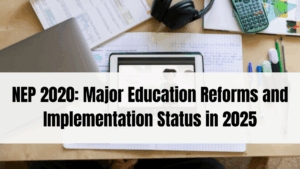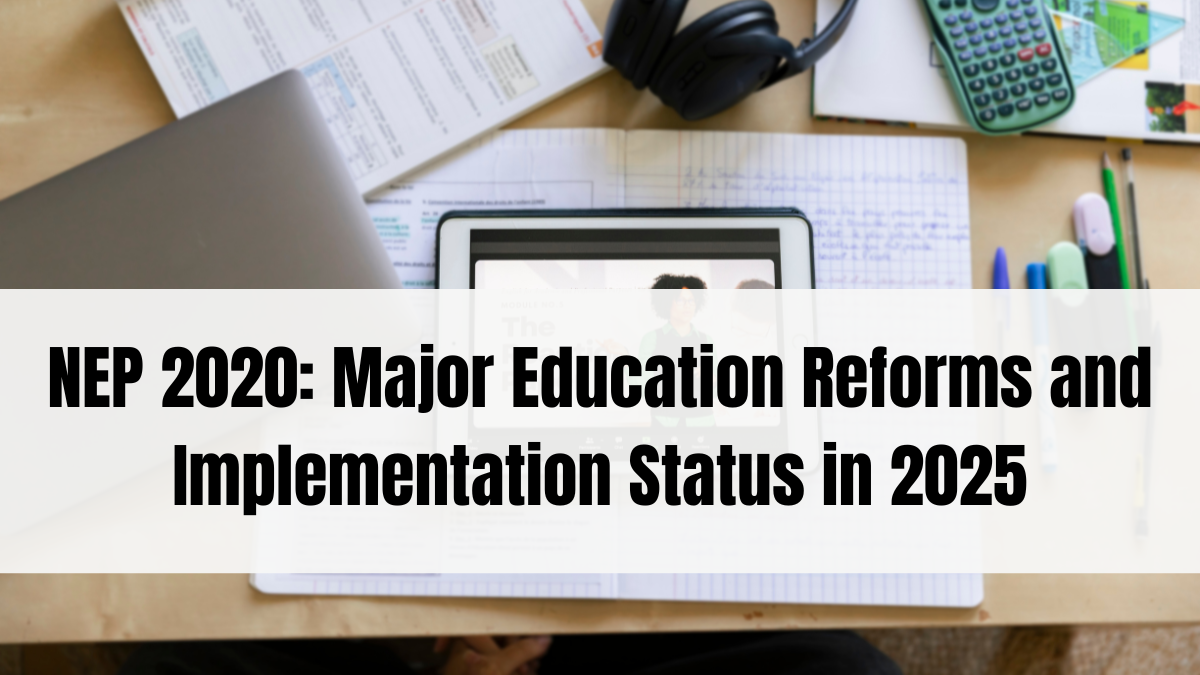India’s National Education Policy (NEP) 2020 aims to revolutionize its academic system through learner-centered education, multidisciplinary study, and digital inclusion. As of 2025, the policy is undergoing substantive rollout—from early childhood care to higher education. This article details the progress, current achievements, and evolving reforms under NEP 2020 latest updates.

Powerful Shifts in Curriculum and Pedagogy
NEP 2020 introduces a 5+3+3+4 structure, replacing the traditional 10+2 format. By 2025:
-
Foundational years (ages 3–8) are aligned with pedagogies focusing on play-based and activity-led learning.
-
Middle and secondary students (Classes 6–12) experience integrated multidisciplinary syllabi including subjects like arts, technology, and environmental studies.
-
The Board Exams for Classes 10 & 12 now emphasize competency-based questions, critical thinking, and application over rote learning.
Several states, including Karnataka, Kerala, and Maharashtra, have completed early implementation of this restructured schooling across both government and private institutions.
Multidisciplinary Higher Education & Flexibility
NEP’s vision of multidisciplinary higher education is taking shape:
-
Multidisciplinary Education and Research Universities (MERUs) are being established or upgraded in several states.
-
Colleges affiliated with UGCs’ Academic Bank of Credits (ABC) allow students to design flexible credit-based courses across disciplines.
-
Dual or multiple degrees are recognized—students can now study, for example, arts and science simultaneously, with credit transfers across colleges.
Digital Learning and Technology Integration
By 2025, NEP has catalyzed digital infrastructure expansion:
-
Launch of Swayam Prabha Plus and DIKSHA app upgrades offering interactive video and AR-based learning.
-
AI-based learning analytics implemented in select smart classrooms for personalized interventions.
-
Regional language content is enhanced via e-learning modules in 14 vernaculars, increasing access in rural regions.
Vocational Education and Skilling for All
NEP’s push toward vocationalisation is gaining momentum:
-
Internships, apprenticeships, and certification programs have become compulsory from Class 6 onwards.
-
Public–private partnerships in skill training centers ensure students gain industry-ready competencies by Class 12.
-
Short-term vocational modules in areas like solar engineering, agritech, and digital media are now integrated into school curricula.
These efforts support India’s ambition to build a competency-based workforce fit for emerging sectors.
Regulatory Framework & Teacher Empowerment
-
The National Higher Education Regulatory Council (NHERC) and National Professional Standards for Teachers (NPST) have been introduced to unify governance and clarify teacher performance benchmarks.
-
Teacher Performance Appraisal System (TPAS) with real-time feedback and annual licensing is operational across many regions.
-
T-Levels (Technical Education Equivalent) programs, coupled with degree apprenticeships, prepare young instructors and technicians in emerging disciplines.
Implementation Status by 2025
Across the education spectrum:
-
Nearly 70% of government schools have transitioned to NEP-aligned curricula.
-
Over 150 universities are piloting ABC-based credit transfers for flexibility in academics.
-
Vocational courses are integrated in over 10,000 schools, and skill-education training is widespread.
-
Assessment reforms in Central Board exams aim to reduce rote preparation and evaluate critical thinking.
FAQs
What major curriculum change has NEP introduced?
The traditional 10+2 structure in schools has been replaced with a 5+3+3+4 structure to encourage holistic and experiential learning from early grades.
What is the Academic Bank of Credits?
ABC allows for credit accumulation and transfer across universities and disciplines, facilitating flexible and interdisciplinary education pathways.
Is vocational training mandatory now?
Yes. From Class 6 onwards, students are required to participate in internships, skill certification modules, and hands-on vocational programs in industry-relevant fields.
How is teacher training being reformed under NEP?
NEP introduces national teaching standards, periodic appraisals, licensing, and continuous professional development to uplift educational quality.
Can students pursue multiple majors via ABC?
Yes, with Academic Bank of Credits, students can earn degrees across disciplines, mix and match subjects, and transfer credits between institutions.
Click here to know more.
